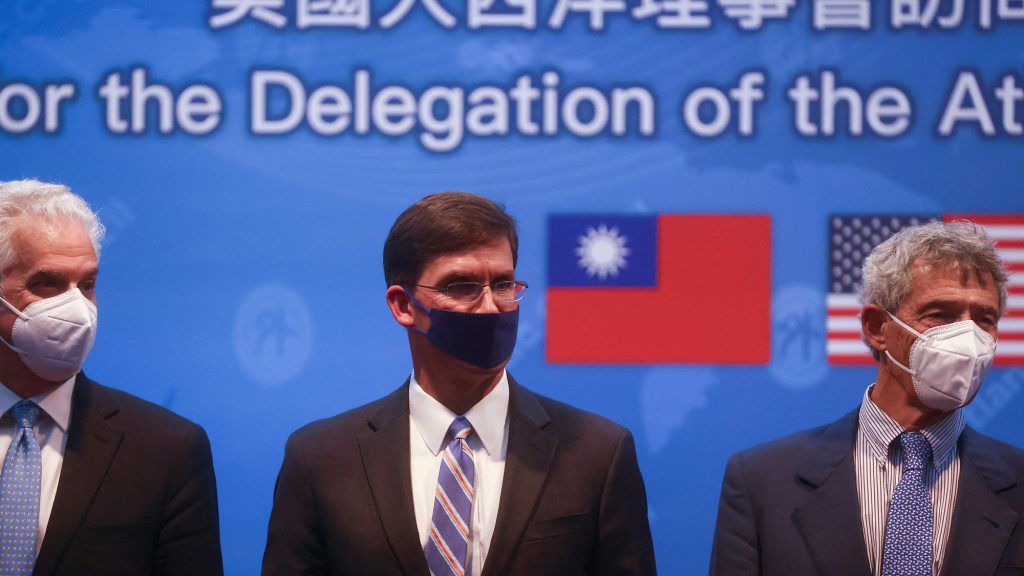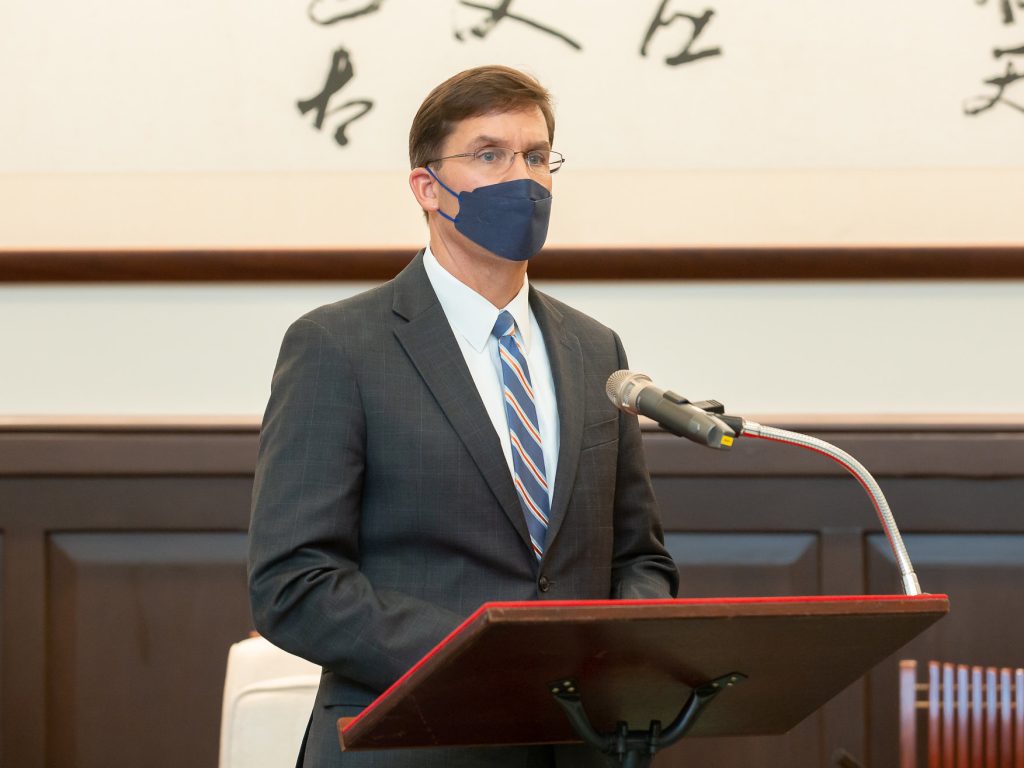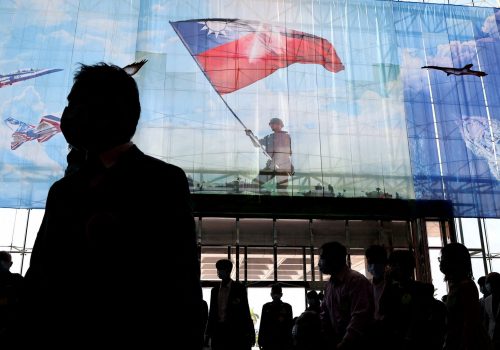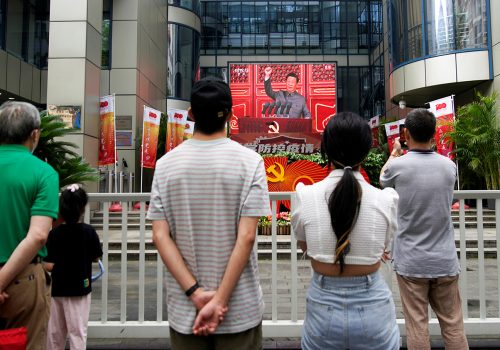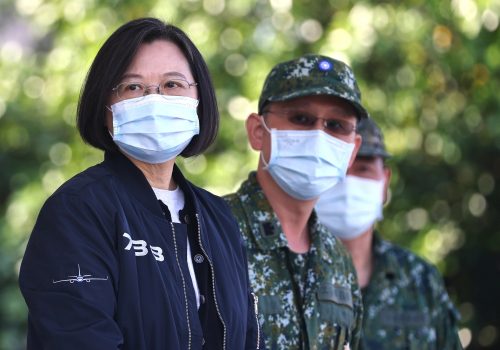Watch the full event
As China intensifies its aggressive messaging around Taiwan, the island must “make the first move” in shoring up its defenses and protecting its national security, said former US Secretary of Defense Mark T. Esper at an exclusive Atlantic Council Front Page event on Tuesday.
He suggested five ways Taiwan can become “the porcupine” that can deter China: increase the defense budget, adopt an asymmetric-warfare strategy; lengthen (up to one year) its conscription and toughen up training; revitalize reserve mobilization and build resilient infrastructure and telecommunications; and stockpile energy supplies, food, and weapons. Doing so would also give the West “more confidence [and] more inspiration” in standing behind Taiwan.
Speaking with Lingling Wei, chief China correspondent for the Wall Street Journal, Esper recalled describing this plan to Taiwanese leaders as part of an Atlantic Council delegation in Taipei last week, organized in partnership with the Taipei Economic and Cultural Representative Office.
“It’s important to go over there… to get a feel for what is happening in Taiwan diplomatically, security-wise, and economically,” Esper said. After China delivered a warning to the United States this week about House Speaker Nancy Pelosi’s possible visit to Taiwan, Esper cautioned US officials to avoid succumbing to Beijing’s threats. “If we allow Beijing to start dictating who can or cannot travel [to Taiwan], then where does that end?” he asked.
Here are more highlights from the event:
China policy: “One” is done
- Citing Biden’s repeated pledges that the United States would militarily defend Taiwan, Esper said the president is “spot on the mark.” With China attempting to change the status quo by increasing incursions and claiming the Taiwan Strait, Esper argued that “less strategic ambiguity is a good thing.” At the very least, he said, US officials are trying to prevent war: “The way to do that is to signal both our resolve and our willingness to act in defense” of Taiwan.
- Arguing that the One China policy is insufficient, Esper has called for a national dialogue between the White House and Congress to design a new China policy. He said it needs to be credible, durable, and principled “because it has to be able to bear the weight of some tough decisions” in the coming years.
- One of the “easy” things the United States can do right now, Esper noted, is to pursue a free-trade agreement with Taiwan—to be completed by the end of next year—and encourage other Western economies to do the same and overcome their fear “of the reaction out of Beijing.”
- Esper also argued that excluding Taiwan from the Indo-Pacific Economic Framework was a mistake, but a free-trade agreement with the island could be a way to acknowledge Taiwan’s important economic role. He asked: “Why shouldn’t we extend the privileges of free trade… to 23 million people in Taiwan who provide strategic resources for us” like semiconductors?
United front
- Former Italian Ambassador to NATO Stefano Stefanini also joined the visit to Taipei, and Esper said his “European view on the situation was particularly important,” since European attitudes toward China have changed “quite dramatically” following China’s support for Russia after its invasion of Ukraine.
- Meanwhile, Esper said he was proud to see allies Australia, Japan, and South Korea step up “diplomatically and economically” against Russia, and explained that because alliances are reciprocal, “European allies should be expected to stand firm if there’s a conflict in Asia.”
- In standing up for Ukraine, Esper said democratic countries are sending “all the right signals that we’re going to stand behind a fellow democracy” like Taiwan. He hopes that as the world watches Western support and a powerful Ukrainian “fighting spirit” continuing to blunt Russia’s invasion, Xi will stand down. “We want Xi Jinping to wake up every day and say, ‘You know, it’s not worth it, costs are too high, [so] I’m not going to make a move on Taiwan,’” Esper explained.
Defense and diplomacy
- Esper predicted that Xi might snag a third term as China’s president at the Twentieth National Congress of the Chinese Communist Party (CCP) later this year, or possibly instead become chairman of the CCP. In the case of a leadership reshuffle, however, he warned that the Chinese leader may feel “more free” to pursue Taiwan or lead a “more aggressive foreign policy.”
- During his visit to Taipei, Esper sought to communicate to officials that Taiwan needs to have a greater sense of urgency to ensure democracy can survive there. Despite Taiwan’s military capability, which includes arms bought from the United States and other forms of assistance, Esper doesn’t think “it’s sufficient to really deter [for the] long haul.”
- As for whether a nonmilitary option exists for China and Taiwan, Esper cautioned that the way China broke promises with Hong Kong over the past twenty-five years leads to skepticism about whether Taiwan can “trust Beijing to live up to their word.” And back then, “the West didn’t do enough to stand up to China,” Esper said. In the case of Taiwan, “we need to stand up for our values and what we believe in.”
Katherine Walla is an assistant director of editorial at the Atlantic Council.
Watch the full event
Further reading
Mon, Jul 18, 2022
Dispatches from Taiwan: Follow an Atlantic Council delegation as it visits the island
New Atlanticist By
The high-level team delivers its insights, analysis, and reporting from the ground.
Sun, Oct 17, 2021
We’re at the perilous beginning of an uncertain era in US-China relations
Inflection Points By Frederick Kempe
The United States and China represent the most significant bilateral relationship in human history—and neither side is managing their rising tensions with adequate skill or durable strategy.
Wed, Jun 30, 2021
The case for greater US-EU collaboration on Taiwan
New Atlanticist By
The United States and the EU emphasize different means, but they still have compelling joint interests that cry out for greater coordination—from the economy to shared security.
Image: Former U.S. Defense Secretary Mark Esper takes a group photo during a press conference in Taipei, Taiwan, July 19, 2022. REUTERS/Ann Wang
